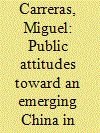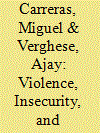| Srl | Item |
| 1 |
ID:
156295


|
|
|
|
|
| Summary/Abstract |
In the past two decades, China has substantially increased its economic presence in Latin America. The impressive rate of economic growth in China has resulted in a voracious appetite for Latin American commodities and energy sources. China has also become a major investor in the region, and has loaned billions of dollars to Latin American countries. This paper evaluates how aware Latin American citizens are of this increased economic presence of China, and also studies citizens’ attitudes toward the rising influence of China in Latin America. Public attitudes toward the Chinese economic and political model, and evaluations of the Chinese popular culture are also presented and discussed. The evidence suggests that the image of China is improving in Latin America as a result of its new economic role in the region. However, Chinese soft power faces several limitations in the region. The Chinese political and economic models, and the Chinese popular culture are still not very attractive in Latin America.
|
|
|
|
|
|
|
|
|
|
|
|
|
|
|
|
| 2 |
ID:
175722


|
|
|
|
|
| Summary/Abstract |
A large social science literature demonstrates a link between personal insecurity and religiosity. When individuals are healthy, literate, and gainfully employed, they tend to be less religious. One of the most fundamental threats to an individual is the risk of violence, but this important marker of insecurity has been unexplored in recent studies of the determinants of religiosity. We use a unique dataset that measures state-sponsored terror, an ideal measure for studying insecurity, and explore the relationship between violence and religious beliefs and practices in 71 countries during the period 1981–2011. We find a robust positive association between violence and religiosity, and offer several reasons to believe that this is a causal relationship. Drawing on psychological studies, we argue that the specific mechanism at work deals with religious coping, a uniquely efficacious way of combating the stress and anxiety produced by the threat of recurrent violence.
|
|
|
|
|
|
|
|
|
|
|
|
|
|
|
|